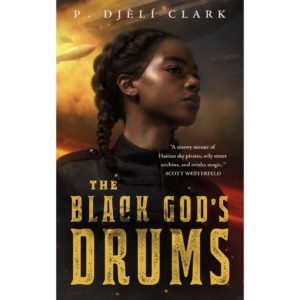“The night in New Orleans always got something going on, ma maman used to say—like this city don’t know how to sleep.” (p. 7) It doesn’t, and neither does P. Djèlí Clark’s splendid, exciting, enchanting novella The Black God’s Drums.
Clark’s first-person narrator, a slightly feral young woman named Creeper, makes her own way in the city, avoiding the constables, the patrols that would get her sent to a workhouse orphanage, or the gangs that would put her under the thumb of a Thieving Boss. She’s found a niche, high up on one of the towers where the airships come in to dock on the hour. She can steal from passengers disembarking; she can overhear things that she can trade with her contacts in the city. As Creeper says, it’s drafty in winter and in summer “all you do is lay about in your own sweat,” (p. 7) but it’s better than many alternatives. She’s got her eyes up, too; the passengers coming from all kinds of places, speaking all kinds of languages, remind her that there’s a big world beyond the iron walls of New Orleans and New Algiers over on the West Bank.
She’s all set to relieve a newly arrived passenger of his gold pocket watch (“Somebody’s bound to snatch it sooner or later—might as well be me.” (p. 8)) when the world falls away and she’s struck by a vision of an enormous skull rising over the city like a full moon of death. It passes almost as fast as it arrived. She recognizes the vision as something sent from Oya, “the goddess of storms, life, death, and rebirth who came over with [Creeper’s mother’s] great-greandmaman from Lafrik and who runs strong in our blood.” (p. 7) The vision lasted long enough for her to lose her mark and, worse luck, for a group of men to be heading her way. Thinking they might be a patrol, she hides in her alcove. Still worse, they head the same way, but fortunately for her they are consumed with their own business and do not notice her hiding in the dark.
And their business is distinctly odd. What are a group of Confederates doing talking to a Cajun about a Haitian scientist?
This New Orleans of 1884 is a free city, wedged between the Confederacy (armistice signed with the Union after Third Antietam), Texas, and a traditional amount of lawlessness in Cajun country. Haiti and the Free Islands dominate the Gulf and the Caribbean, aided by their superior science and supernatural assistance like Creeper’s close association with Oya.
They are setting up a deal:
The Cajun claps, and I imagine him smiling. ‘Den it should work out fine.’ He extends a hand and the captain offers over a thick wad of something. The unmistakable beautiful sound of crisp bills being counted fills up my alcove. ‘You’ll get the rest when we see this scientist—and his invention,’ the captain states.
‘Wi, Capitaine,’ the Cajun replies. ‘You give him his jewel and he gonna hand over dat ting you want.’ He stops his counting and leans in close. ‘De Black God’s Drums. Maybe you boys able to win dis war yet, yeah.’
The captain dips his head in a nod before answering. ‘Maybe.’
There’s some more talk. Nothing important from what I can tell. Just the questions and assurances of men who don’t trust each other and who up to no good. (p. 10)
Creeper has an idea what the Black God’s Drums might be, and it’s bigger than anything she might steal that night. Maddi grá is coming to the Crescent City soon, perfect cover for the kind of scheme that the Confederates are cooking up. She works her sources in the city for a couple of days and figures out who would be best placed to foil the nefarious scheme: “The captain of the airship Midnight Robber is as tall as I remember— not so much as most men, but a good height. She wears snug-fitting tan britches on long lean legs, and the red and green jacket of a Free Isles flyer. Her coils of black hair are pulled back by metal clasps above a dark brown face with the kind of big eyes men like talking about. She scans around the place, one hand dropping to rest on a pistol at her waist.” The captain joins some of her officers, a Hindoo (“… a smile that makes even me blush. Didn’t even know men could have eyelashes that long”) and “the biggest Chinaman I ever put eyes on [he’s actually Mongolian], wearing a tall wide-brimmed tan cowboy hat, of all things, and a long matching frock coat.” (all p. 17)
Creeper’s right. The captain is very interested in stopping the Confederates from getting the Black God’s Drums. When the captain explains why, Creeper is shaken to her marrow. Her price for bringing the information is to come along and then to join the crew of the Midnight Robber. Capt. Ann-Marie St. Augustine is initially nonplussed, but Creeper knows things about her, knows that the captain is more than she appears, and so she agrees to consider Creeper’s request.
With that, the race is on. Clark brings fast and fun action, with surprises and reversals, and an outcome that isn’t clear until the very end. It’s a page-turner in the best sense, sprinkled with lots of local bon temps rouler, and enough dirigible alternity to make the setting plenty interesting. More, please. Lots more.

